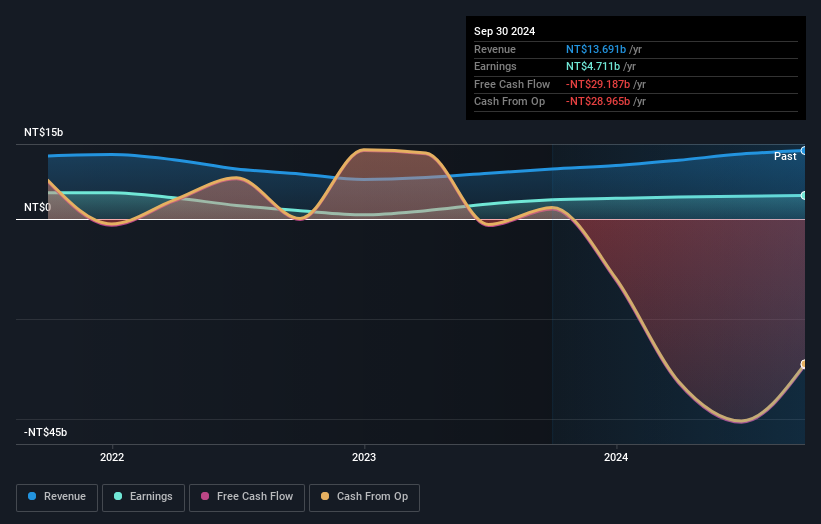- Taiwan
- /
- Capital Markets
- /
- TWSE:6005
Individual investors in Capital Securities Corporation (TWSE:6005) are its biggest bettors, and their bets paid off as stock gained 3.1% last week

Key Insights
- Significant control over Capital Securities by individual investors implies that the general public has more power to influence management and governance-related decisions
- 46% of the business is held by the top 25 shareholders
- Institutional ownership in Capital Securities is 21%
A look at the shareholders of Capital Securities Corporation (TWSE:6005) can tell us which group is most powerful. With 53% stake, individual investors possess the maximum shares in the company. That is, the group stands to benefit the most if the stock rises (or lose the most if there is a downturn).
Clearly, individual investors benefitted the most after the company's market cap rose by NT$1.7b last week.
Let's take a closer look to see what the different types of shareholders can tell us about Capital Securities.
View our latest analysis for Capital Securities

What Does The Institutional Ownership Tell Us About Capital Securities?
Institutional investors commonly compare their own returns to the returns of a commonly followed index. So they generally do consider buying larger companies that are included in the relevant benchmark index.
Capital Securities already has institutions on the share registry. Indeed, they own a respectable stake in the company. This can indicate that the company has a certain degree of credibility in the investment community. However, it is best to be wary of relying on the supposed validation that comes with institutional investors. They too, get it wrong sometimes. When multiple institutions own a stock, there's always a risk that they are in a 'crowded trade'. When such a trade goes wrong, multiple parties may compete to sell stock fast. This risk is higher in a company without a history of growth. You can see Capital Securities' historic earnings and revenue below, but keep in mind there's always more to the story.

Hedge funds don't have many shares in Capital Securities. Our data shows that Capital Investment Trust Corporation is the largest shareholder with 8.2% of shares outstanding. For context, the second largest shareholder holds about 3.6% of the shares outstanding, followed by an ownership of 3.5% by the third-largest shareholder.
On studying our ownership data, we found that 25 of the top shareholders collectively own less than 50% of the share register, implying that no single individual has a majority interest.
Researching institutional ownership is a good way to gauge and filter a stock's expected performance. The same can be achieved by studying analyst sentiments. Our information suggests that there isn't any analyst coverage of the stock, so it is probably little known.
Insider Ownership Of Capital Securities
While the precise definition of an insider can be subjective, almost everyone considers board members to be insiders. Company management run the business, but the CEO will answer to the board, even if he or she is a member of it.
I generally consider insider ownership to be a good thing. However, on some occasions it makes it more difficult for other shareholders to hold the board accountable for decisions.
Our data suggests that insiders own under 1% of Capital Securities Corporation in their own names. However, it's possible that insiders might have an indirect interest through a more complex structure. Keep in mind that it's a big company, and the insiders own NT$39m worth of shares. The absolute value might be more important than the proportional share. It is always good to see at least some insider ownership, but it might be worth checking if those insiders have been selling.
General Public Ownership
The general public, who are usually individual investors, hold a substantial 53% stake in Capital Securities, suggesting it is a fairly popular stock. With this amount of ownership, retail investors can collectively play a role in decisions that affect shareholder returns, such as dividend policies and the appointment of directors. They can also exercise the power to vote on acquisitions or mergers that may not improve profitability.
Private Company Ownership
We can see that Private Companies own 25%, of the shares on issue. It might be worth looking deeper into this. If related parties, such as insiders, have an interest in one of these private companies, that should be disclosed in the annual report. Private companies may also have a strategic interest in the company.
Next Steps:
It's always worth thinking about the different groups who own shares in a company. But to understand Capital Securities better, we need to consider many other factors. To that end, you should learn about the 3 warning signs we've spotted with Capital Securities (including 2 which are a bit concerning) .
Of course, you might find a fantastic investment by looking elsewhere. So take a peek at this free list of interesting companies.
NB: Figures in this article are calculated using data from the last twelve months, which refer to the 12-month period ending on the last date of the month the financial statement is dated. This may not be consistent with full year annual report figures.
New: AI Stock Screener & Alerts
Our new AI Stock Screener scans the market every day to uncover opportunities.
• Dividend Powerhouses (3%+ Yield)
• Undervalued Small Caps with Insider Buying
• High growth Tech and AI Companies
Or build your own from over 50 metrics.
Have feedback on this article? Concerned about the content? Get in touch with us directly. Alternatively, email editorial-team (at) simplywallst.com.
This article by Simply Wall St is general in nature. We provide commentary based on historical data and analyst forecasts only using an unbiased methodology and our articles are not intended to be financial advice. It does not constitute a recommendation to buy or sell any stock, and does not take account of your objectives, or your financial situation. We aim to bring you long-term focused analysis driven by fundamental data. Note that our analysis may not factor in the latest price-sensitive company announcements or qualitative material. Simply Wall St has no position in any stocks mentioned.
About TWSE:6005
Capital Securities
Provides various financial services in Taiwan and internationally.
Average dividend payer low.
Market Insights
Community Narratives




